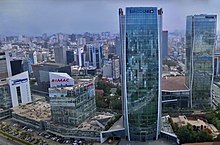Portal:Business
The Business and Economics Portal Business is the practice of making one's living or making money by producing or buying and selling products (such as goods and services). It is also "any activity or enterprise entered into for profit." A business entity is not necessarily separate from the owner and the creditors can hold the owner liable for debts the business has acquired. The taxation system for businesses is different from that of the corporates. A business structure does not allow for corporate tax rates. The proprietor is personally taxed on all income from the business. A distinction is made in law and public offices between the term business and a company such as a corporation or cooperative. Colloquially, the terms are used interchangeably. (Full article...) Economics (/ˌɛkəˈnɒmɪks, ˌiːkə-/) is a social science that studies the production, distribution, and consumption of goods and services. Economics focuses on the behaviour and interactions of economic agents and how economies work. Microeconomics analyses what is viewed as basic elements in the economy, including individual agents and markets, their interactions, and the outcomes of interactions. Individual agents may include, for example, households, firms, buyers, and sellers. Macroeconomics analyses the economy as a system where production, distribution, consumption, savings, and investment expenditure interact, and factors affecting it: factors of production, such as labour, capital, land, and enterprise, inflation, economic growth, and public policies that have impact on these elements. (Full article...) Selected articleJack Ma Yun (Chinese: 马云; pinyin: Mǎ Yún; born September 10, 1964) is a Chinese business magnate, investor and philanthropist. He is the co-founder of Alibaba Group, a multinational technology conglomerate. In addition, Ma is also the co-founder of Yunfeng Capital, a Chinese private equity firm. , with a net worth of $30.1 billion, Ma is the sixth-wealthiest person in China, as well as the 50th wealthiest person in the world, ranked by Bloomberg Billionaires Index. Born in Hangzhou, Zhejiang, Ma earned a Bachelor of Arts degree with a major in English upon graduating from Hangzhou Normal University in 1988. He became an English lecturer and international trade lecturer at Hangzhou Dianzi University following graduation. The rise and expansion of the software and personal-computer industries during the 1980s captured Ma's attention, prompting him to develop an interest in the nascent internet industry. Demonstrating such a propensity led him into the realm of internet entrepreneurship where he embarked on establishing his first business in 1994, subsequently resulting in the formation of a second company upon acquiring a deeper understanding of the internet's emergence and the promising commercial prospects it offered. From 1998 to 1999, he resigned from China Telecommunications Corporation, later starting the Alibaba Group with his colleagues in 1999. The company was initially founded as a B2B e-commerce marketplace website, yet the company later expanded into a wide range of industry domains across the Chinese economy, including e-commerce, high-technology, and online payment solutions. Selected image
Selected economyThe economy of Peru is an emerging, mixed economy characterized by a high level of foreign trade and an upper middle income economy as classified by the World Bank. Peru has the forty-seventh largest economy in the world by total GDP and currently experiences a high human development index. The country was one of the world's fastest-growing economies in 2012, with a GDP growth rate of 6.3%. The economy was expected to increase 9.3% in 2021, in a rebound from the COVID-19 pandemic in Peru. Peru has signed a number of free trade agreements with its main trade partners. China became the nation's largest trading partner following the China–Peru Free Trade Agreement signed on 28 April 2009. Additional free trade agreements have been signed with the United States in 2006, Japan in 2011 and the European Union in 2012. Trade and industry are centralized in Lima while agricultural exports have led to regional development within the nation. (Full article...) Selected quote" My dear Bowley, I have not been able to lay my hands on any notes as to Mathematico-economics that would be of any use to you: and I have very indistinct memories of what I used to think on the subject. I never read mathematics now: in fact I have forgotten even how to integrate a good many things. But I know I had a growing feeling in the later years of my work at the subject that a good mathematical theorem dealing with economic hypotheses was very unlikely to be good economics: and I went more and more on the rules---(1) Use mathematics as a short-hand language, rather than as an engine of inquiry. (2) Keep to them till you have done. (3) Translate into English. (4) Then illustrate by examples that are important in real life. (5) Burn the mathematics. (6) If you can't succeed in 4, burn 3. This last I did often. I believe in Newton's Principia Methods, because they carry so much of the ordinary mind with them. Mathematics used in a Fellowship thesis by a man who is not a mathematician by nature---and I have come across a good deal of that---seems to me an unmixed evil. And I think you should do all you can to prevent people from using Mathematics in cases in which the English language is as short as the Mathematical. .... I find mathematicians almost invariably follow what I regard as Jevons' one great analytical mistake, his eulogy of the Geometric mean in general: and do not see that, according to his use, erroneous weighting may do far more mischief with the Geometric Mean than with the Arithmetic Mean. I always have to spend some time in convincing them of the danger. Your emptyhandedly,"
TopicsRelated WikiProjectsDid you know (auto-generated) -
On this day in business history
General imagesThe following are images from various business-related articles on Wikipedia.
More did you know
Business news Wikinews Economy and business portal
|








































